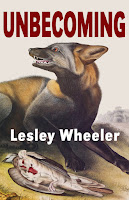Pleasures of 2024
by Lesley Wheeler
During the summer, I spent two weeks in Scotland. I read many memorable books to set the mood. Some were new, some old, but all have some weird or magical elements. What stayed with me most powerfully were George Mackay Brown’s An Orkney Tapestry; Robin Robertson’s Grimoire; Margot Livesey’s The Road to Belhaven; James Robertson’s The Testament of Gideon Mac; and Emma Seckel’s The Wild Hunt. After years of procrastination—despite my academic specialty in modernism—I finally faced up to Hugh MacDiarmid’s long poem A Drunk Man Looks at the Thistle. It has a well-earned reputation for difficulty, but I was surprised to find that it’s also very funny.
I tend to oscillate between reading for immersive pleasure and reading by assignment. Some of the homework is work-driven—for my classes, tenure reviews I’m asked to undertake, and more—but the rest I assign to myself, as in my unofficial Scottish authors syllabus. I was commissioned to write a short scholarly piece about a Bob Dylan song this summer and wow, there’s a lot of Dylanology out there, so that assignment was bigger than I expected. I absorbed as much as I could, but Suze Rotolo’s memoir A Freewheelin’ Time was a favorite. I also tried to keep up, not entirely successfully, with the publications of my prolific spouse, Chris Gavaler. His 2023 co-authored book (with Nat Goldberg) happened to be politically on point: Revising Reality: How Sequels, Remakes, Retcons, and Rejects Explain the World asks, for example, “When overturning Roe v. Wade, did the Supreme Court end the right to abortion, or did the Court claim that the right of the previous half century never existed?” Research-wise I’m on a fungal kick with a mycelium-themed poetry collection, Mycocosmic, due in March 2025, and was fascinated by Chesak’s thoroughly researched The Psilocybin Handbook for Women.
Evenings are immersive-novel-time. It was a revelation to reread all of Ursula K. LeGuin’s Earthsea books, each more powerful than the last. I was riveted by Martha Wells’ Murderbot series. I’m currently rereading Agatha Christie and while I can’t seem to stop, her early books especially are so spiked with racism and misogyny that they’re not exactly consoling. I felt ambivalent about most of the so-called literary fiction I read, but the long novel Trust by Hernan Diaz is wholly worth anyone’s investment, ahem. I caught some mixed reviews of Kelly Link’s first novel, The Book of Love, but it delighted me.
On the poetry side, I expected to love Diane Seuss’s new collection Modern Poetry—and did. I learned so much from Robert Dale Parker’s Changing Is Not Vanishing: A Collection of American Indian Poetry to 1930, an anthology that’s also a superb work of scholarship. I discovered many poetic engagements with fantasy and science even when I wasn’t looking for them: an eerie split self in Sarah Kain Gutowski’s The Familiar; critique of supernatural rhetoric around Blackness in Gregory Pardlo’s Spectral Evidence; and the science of climate change permeating Claire Wahnaholm’s Meltwater and Jen Karetnik’s Inheritance with a High Error Rate. Finally, I have to call out a fun chapbook-length anthology of short pieces about cryptids, Mothman Was Here, edited by Will Woolfitt. Being asked to contribute a poem sent me down many Reddit rabbit holes about a local cryptid, Not Deer, a creature I hope not to meet in the dark forests of 2025.
Lesley Wheeler, Poetry Editor of Shenandoah, is the author of Mycocosmic, runner-up for the Dorset Prize and her sixth poetry collection. Her other books include two Aqueduct titles, the novel Unbecoming and novel-in-verse The Receptionist and Other Tales, as well as the hybrid memoir Poetry’s Possible Worlds. Wheeler’s work has received support from the Fulbright Foundation, the National Endowment for the Humanities, Bread Loaf Environmental Writers Workshop, and the Sewanee Writers Workshop; her poems and essays have appeared in Poetry, Poets & Writers, Strange Horizons, Lady Churchill’s Rosebud Wristlet, Ecotone, and elsewhere.















